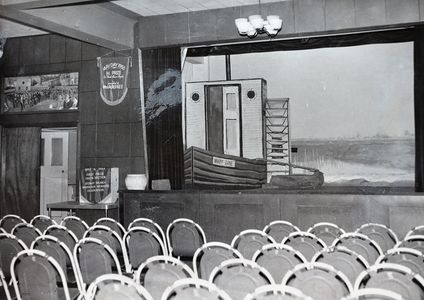The 1950s - Premises
New Theatre History Home | Previous: The 1940s - The Environment | Next: The 1950s - War and Peace
When a court order forced it to vacate 167 Castlereagh Street in April 1954, the New had trouble finding other accommodation, city rentals being in short supply. As a “temporary” measure the theatre moved into the hall in the Waterside Workers’ Federation (WWF) building at 60 Sussex Street where it remained until 1963 under the auspices of the WWF Cultural Committee. The hall was booked through Secretary Tom Nelson and Treasurer Stan Moran. Before getting space in the WWF’s Unity House at 52 Phillip Street the New’s office was run from Secretary Miriam Hampson’s flat. A rented garage stored stage furniture and props. Leasing several different addresses was a major strain on finances, lack of proper premises led to the cessation of classes and Workshop, and rehearsals were held in church halls and members’ homes.
The WWF put up with late payment of its nominal rent, requests for extra rehearsal times, and the caretaker having to hang around until past midnight, beyond the 10.30 pm curfew. But there were ongoing problems for NT which could play there only two nights – Saturday and Sunday. Audiences had trouble finding the venue, marked only by an outside banner on performance nights. The stage was small and the wingspace minimal. After the Sunday show sets, props and furniture had to be struck and stored in a tiny loft and the makeshift dressing room cleared. Because of vermin the actors’ teacups were stored in a rat-proof box. When the iceman didn’t turn up the audience’s cordial drinks couldn’t be kept cold.
In summer the hall was like an oven, cigarette smoke adding to the discomfort. A committee decision was made to ban smoking during performances and to put up a no smoking sign, but even after the move to St Peters Lane a Front of House task was to sift out the butts from the sand-tray to avoid having to buy more sand, and a suggestion that patrons be offered a light.
The biggest disadvantage was that the hall was regularly needed for other uses and performances cancelled, sometimes at short notice after ads had already been placed in the Tribune. This meant loss of income, audience loyalty and block bookings, and playing only one night a week did not help actors’ performances. The number of productions dwindled and theatre membership fell. Financial and political stress marked the period at the WWF hall. In 1954 only two productions had seasons there; the hugely successful Reedy River instead played one-night gigs in venues stretching from West Lindfield to Sutherland, from Blacktown to Newcastle.
NT members lugged a gramophone to Mary Gilmore’s Kings Cross flat so she could listen to the Reedy River recording, and June Grivas composed an ode to the New’s most successful money-spinner:
Some people they like Homer, others they like Shaw
And others like the “classics”, I could name ‘em by the score.
Some people they like “epics” crammed full of blood and lust
While others go quite drooly over Marilyn Monroe’s bust.
But me, I like the stories of Australia land
Of the pioneers, the shearers and the gallant Eureka Band.
I’m not the only one, there’s at least 10 million more
So just give us Reedy River and the Eumerella Shore.
The nexus with those who worked on the waterfront was reinforced by the theatre’s move back to the harbour end of town. A number of maritime workers became NT members. Lionel Parker turned his protest against Daily Telegraph allegations that wharfies were drunk, lazy and strike-prone into a piece of agit-prop, while others supported the Seamen’s Union by performing sketches on wharves and at pay depots in lunch breaks. Ken Rowsthorne earned the nickname “The singing wharfie”.
As a committed supporter of the Tribune, New Theatre participated in the newspaper's social and fundraising events. The CPA pressured theatre members to increase its sales and those of Challenge. Nevertheless, unsold copies of Tribune and undistributed CPA leaflets ended up in a bottom drawer or an incinerator.
New Theatre History Home | Previous: The 1940s - The Environment | Next: The 1950s - War and Peace











